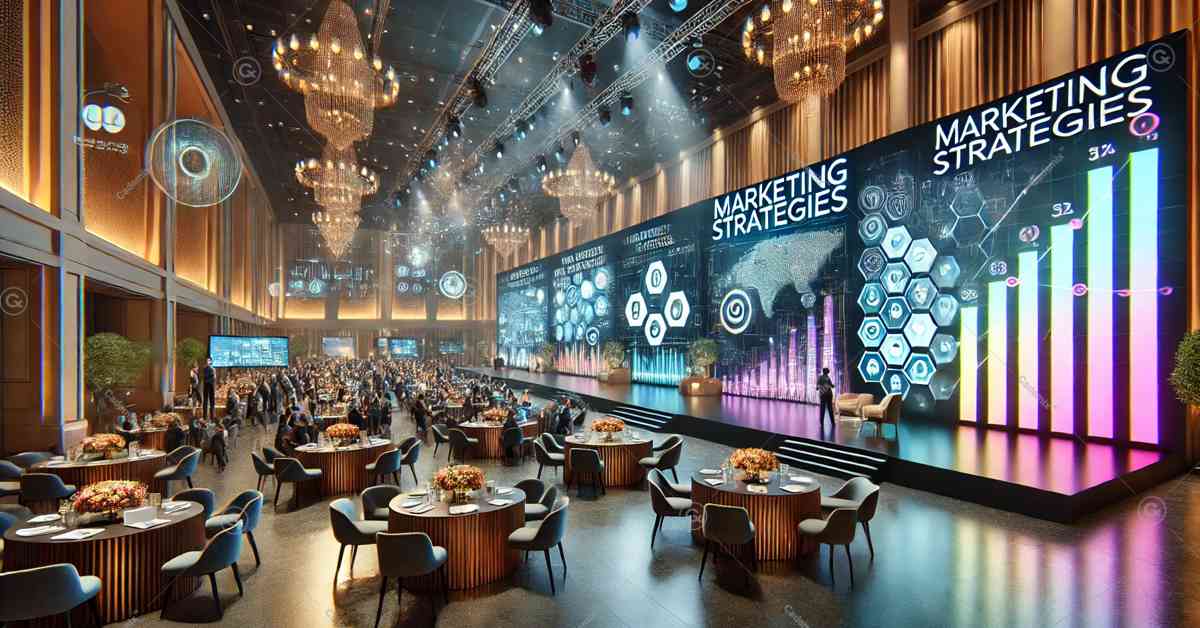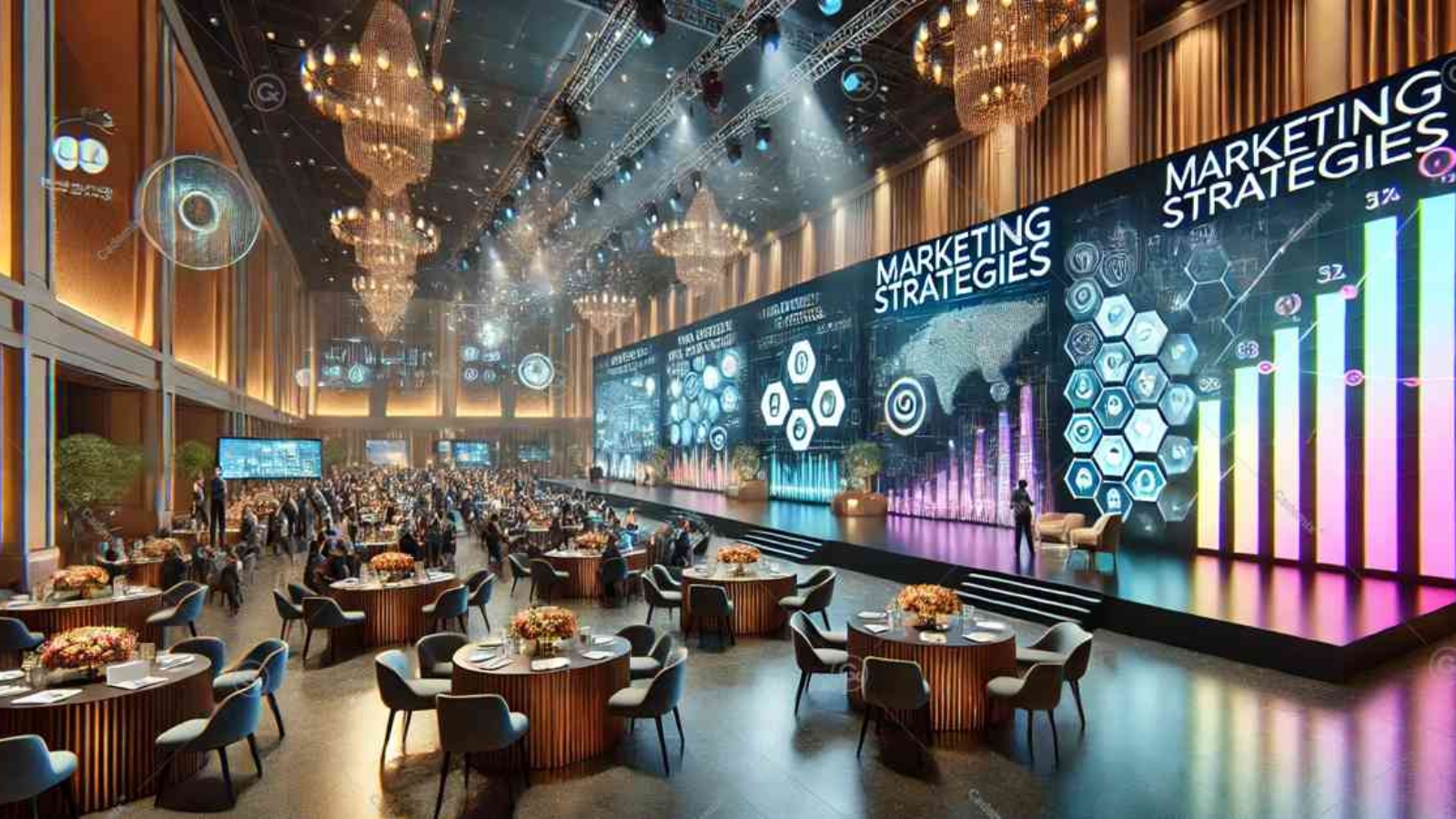In the dynamic field of event management, staying ahead requires the adoption of innovative marketing strategies that leverage the latest technology and trends. This article explores how event planners can integrate experiential marketing, hybrid events, and sustainable practices to enhance their marketing efforts. From budget management to effective communication, and post-event evaluation, the article delves into actionable techniques that ensure successful event planning and promotion. By focusing on emerging event trends in 2024 and utilizing advanced event technology tools, this guide offers a comprehensive approach to maximizing engagement and driving event success.
By Samareh Ghaem Maghami, Associate Consultant and Project at Cademix Institute of Technology
Introduction
In today’s rapidly evolving landscape of event management, the role of innovative marketing strategies has never been more crucial. As the demands on event planners grow, so does the need for creative and effective approaches to event marketing that not only capture attention but also deliver measurable results. Whether you’re managing a small corporate gathering or a large-scale international conference, the integration of advanced technology, experiential marketing, and sustainability into your event planning can set you apart from the competition. This article takes a deep dive into the latest marketing techniques and tools that can help event managers effectively promote their events, ensuring maximum engagement and success.
By understanding the synergy between event management and marketing strategies, and by staying ahead of emerging event trends in 2024, you can elevate your event’s visibility and impact in a competitive market.

Understanding the Role of Marketing in Event Management
In the realm of event management, the integration of marketing strategies is essential to the success of any event, from the initial concept to the final execution. Event planning and marketing are inherently intertwined, with each aspect influencing the other. Effective event marketing not only drives attendance but also enhances the overall experience for participants, sponsors, and stakeholders.
At the core of successful event management is effective communication. By strategically communicating with potential attendees, sponsors, and vendors, event managers can build strong relationships that lead to increased participation and engagement. Stakeholder management becomes a pivotal part of this process, ensuring that all parties involved are aligned with the event’s goals and objectives.
Moreover, the rise of technology in events has transformed how marketing is conducted. From leveraging event technology tools like mobile apps and social media platforms to utilizing data analytics for targeted marketing, technology has become a powerful ally in promoting events. The advent of hybrid events—which blend physical and digital experiences—further amplifies the reach of marketing efforts, allowing event planners to engage with a broader audience.
Understanding these dynamics is crucial for event managers who wish to stay competitive. By integrating marketing strategies into every phase of event planning, from logistics and vendor negotiation to post-event analysis, you can ensure a well-rounded approach that not only meets but exceeds the expectations of all involved.
Innovative Marketing Strategies for Event Managers
In the highly competitive field of event management, embracing innovative marketing strategies is key to standing out and ensuring the success of your events. As the industry evolves, event planners must continuously explore new and creative ways to engage their target audience and maximize event visibility.
One of the most effective approaches is experiential marketing, which focuses on creating immersive and memorable experiences for attendees. This strategy goes beyond traditional marketing by engaging the senses and emotions of participants, leading to deeper connections and lasting impressions. Successful examples of experiential marketing in event planning include interactive exhibits, live demonstrations, and personalized attendee experiences that resonate on a personal level.
Another game-changer in event marketing is the rise of hybrid events. These events, which combine physical and virtual elements, offer unique marketing opportunities. By leveraging the reach of digital platforms, event managers can attract a global audience, while still providing the in-person experiences that attendees value. Effective promotion of hybrid events requires a dual approach: targeting both online and offline channels to maximize participation and engagement.
Technology in event marketing is another critical component of modern event management. The use of event technology tools, such as mobile apps, live streaming, and social media integration, allows for real-time engagement and broader reach. Additionally, data analytics plays a pivotal role in refining marketing efforts, enabling event planners to tailor their strategies based on attendee behavior and preferences. AI-driven tools can automate tasks such as personalized email campaigns, social media ads, and attendee segmentation, making marketing more efficient and impactful.
To stay ahead, event managers must also be attuned to event trends in 2024 and beyond. Sustainability has become a significant consideration in both event planning and marketing. Promoting your event as eco-friendly can attract environmentally-conscious attendees and sponsors. This includes highlighting sustainable practices such as reducing waste, using eco-friendly materials, and minimizing the carbon footprint of the event.
Incorporating creativity into your marketing strategies is another way to differentiate your events. Creative storytelling, unique branding, and innovative content can capture the attention of potential attendees and generate buzz. For instance, using experiential marketing tactics in your promotional materials, such as virtual reality previews or interactive teasers, can create anticipation and drive interest.
By combining these innovative marketing strategies with the foundational elements of event management—such as effective stakeholder management, vendor negotiation, and budget management—you can ensure that your events not only reach but exceed their goals.

Leveraging Trends in Event Marketing
To maintain a competitive edge in the event management industry, it’s essential for event planners to stay ahead of emerging trends and integrate them into their marketing strategies. The evolving landscape of events in 2024 presents a wealth of opportunities for those willing to innovate and adapt.
One of the most prominent event trends in 2024 is the increased focus on sustainability. As environmental concerns become more pressing, both attendees and stakeholders are demanding that events minimize their environmental impact. This shift presents a unique marketing opportunity: by promoting your event’s commitment to sustainable practices, you can attract a growing segment of eco-conscious participants and sponsors. Highlighting efforts such as waste reduction, the use of renewable energy, and sourcing eco-friendly materials can significantly enhance your event’s appeal and reputation.
Incorporating creativity in event planning is another key trend that can amplify your marketing efforts. Today’s audiences are looking for unique and memorable experiences that stand out from the crowd. By infusing creativity into your event’s design, theme, and activities, you can create compelling marketing narratives that captivate potential attendees. For example, a creatively themed event can inspire engaging promotional content, from visually striking social media campaigns to interactive previews that spark curiosity and excitement.
Another significant trend is the rise of experiential marketing in event management. This approach focuses on creating immersive, hands-on experiences that engage attendees on a deeper level. Events that offer interactive elements, such as live demonstrations, workshops, and personalized experiences, not only attract more participants but also generate positive word-of-mouth marketing. Showcasing these experiences in your promotional materials can help potential attendees envision the value of attending your event.
The growing prevalence of hybrid events is reshaping how events are marketed. By blending in-person and virtual experiences, hybrid events offer the flexibility to engage a wider audience, regardless of geographic location. To effectively market a hybrid event, it’s important to highlight the unique benefits of both the physical and virtual components. For instance, you can promote the convenience of virtual attendance alongside the networking opportunities and tangible experiences available at the in-person event. Utilizing event technology tools like live streaming, virtual reality, and interactive online platforms can enhance the marketing appeal of your hybrid event.
As event planners navigate these trends, it’s also crucial to leverage the power of data analytics. Understanding attendee preferences and behaviors allows for more targeted and personalized marketing campaigns. Whether through AI-driven segmentation, personalized email marketing, or tailored social media advertising, using data to refine your marketing approach ensures that your message resonates with the right audience.
In conclusion, staying attuned to event trends in 2024 and beyond is vital for crafting effective marketing strategies in the field of event management. By embracing sustainability, fostering creativity, harnessing the potential of experiential marketing, and optimizing the reach of hybrid events, event planners can position their events for success in a rapidly changing industry.
Budget Management and Cost-Effective Marketing
In the world of event management, balancing creativity and innovation with practical budget management is crucial. While event planners are often tasked with creating unforgettable experiences, they must also ensure that these experiences are delivered within a defined budget. Effective budget management doesn’t just involve cutting costs—it’s about strategically allocating resources to maximize impact, especially when it comes to event marketing.
One of the most effective ways to achieve cost-efficient event marketing is by prioritizing your spending based on the event’s goals and target audience. By identifying the key marketing channels that will yield the highest return on investment (ROI), you can focus your budget where it matters most. For instance, if your event is targeted at a younger, tech-savvy audience, investing in digital marketing strategies such as social media campaigns, influencer partnerships, and targeted online ads might offer better ROI than traditional advertising methods.
Vendor negotiation plays a significant role in budget management and can directly impact your marketing efforts. Negotiating favorable terms with vendors and sponsors not only helps reduce costs but can also open up collaborative marketing opportunities. For example, vendors may agree to co-promote the event through their own channels, effectively expanding your marketing reach without additional cost. Similarly, securing sponsorship deals that include marketing support, such as branded content or cross-promotion, can enhance the event’s visibility and appeal.
Leveraging technology in events can also be a cost-effective way to amplify your marketing efforts. Tools like event management software, automated email marketing platforms, and social media scheduling tools can streamline your marketing processes, allowing you to achieve more with less. These technologies enable event planners to efficiently manage campaigns, track performance, and adjust strategies in real time, ensuring that marketing dollars are spent wisely.
Another strategy for cost-effective marketing is to harness the power of experiential marketing without breaking the bank. Creating impactful experiences doesn’t always require a large budget—often, it’s the creativity and uniqueness of the experience that resonates most with attendees. For example, simple yet innovative ideas like interactive social media challenges, personalized attendee experiences, or pop-up events within the main event can generate buzz and encourage organic sharing, extending your marketing reach at minimal cost.
Hybrid events present an additional opportunity for cost-effective marketing. By offering both in-person and virtual attendance options, event planners can cater to a broader audience without significantly increasing costs. Marketing a hybrid event involves highlighting the benefits of both formats, which can be done through cost-effective channels like email marketing, social media, and partnerships with influencers who can help promote the event across multiple platforms.
Lastly, adopting sustainable practices in event marketing not only aligns with current event trends but can also be a cost-saving measure. For instance, digital marketing materials are not only more sustainable than printed flyers but are also less expensive to produce and distribute. Additionally, promoting your event’s sustainability efforts can be a strong selling point in your marketing campaigns, attracting like-minded attendees and sponsors who value environmental responsibility.
In summary, effective budget management in event marketing requires a strategic approach that balances innovation with cost-efficiency. By prioritizing high-ROI marketing channels, negotiating favorable vendor agreements, leveraging technology, and embracing sustainability, event planners can achieve impactful marketing outcomes without exceeding their budget. This approach ensures that every marketing dollar is spent wisely, contributing to the overall success of the event.

Post-Event Marketing and Evaluation
The success of an event doesn’t end when the last attendee leaves; it extends into the critical phase of post-event marketing and evaluation. For event managers, this phase is crucial not only for measuring the success of the event but also for setting the stage for future events. By integrating post-event evaluation into your overall event management strategy, you can gain valuable insights that inform future marketing strategies and drive continuous improvement.
Post-event evaluation begins with gathering and analyzing feedback from attendees, sponsors, vendors, and stakeholders. This feedback is invaluable for understanding what worked well and what areas need improvement. Tools like surveys, social media polls, and direct interviews can provide qualitative and quantitative data on attendee satisfaction, the effectiveness of marketing strategies, and the overall event experience. By identifying trends in this data, event planners can refine their event planning and marketing efforts to better meet the needs of their target audience in the future.
One of the most important aspects of post-event marketing is maintaining engagement with attendees even after the event has concluded. This can be achieved through follow-up communications, such as thank-you emails, post-event surveys, and exclusive content like recorded sessions, photo galleries, or event highlights. These communications not only show appreciation to attendees but also keep your event top-of-mind, encouraging them to participate in future events. Additionally, sharing success stories, attendee testimonials, and key outcomes from the event on social media and your website can serve as powerful marketing tools for future events.
Leveraging the power of stakeholder management is also critical in the post-event phase. Building and nurturing relationships with key stakeholders—such as sponsors, partners, and vendors—can lead to long-term collaborations and support for future events. Engaging with these stakeholders after the event, sharing outcomes, and discussing opportunities for improvement can help solidify these partnerships. This ongoing communication demonstrates your commitment to mutual success and can lead to enhanced marketing efforts through collaborative promotions, co-branded content, and sponsorship renewals.
Event technology tools play a vital role in both post-event evaluation and marketing. Analytics platforms can provide insights into attendee behavior, such as which sessions were most popular, how attendees interacted with digital content and overall satisfaction levels. This data can be used to create detailed reports that highlight the event’s successes and areas for growth. Furthermore, these insights can guide the development of targeted marketing campaigns for future events, ensuring that your promotional efforts resonate with the right audience.
Sustainability is another key consideration in the post-event marketing phase. Highlighting your event’s sustainability initiatives and their impact can be a compelling message in your marketing efforts. Whether it’s showcasing the reduction of waste, the use of eco-friendly materials, or the offset of the event’s carbon footprint, promoting these achievements can attract a more environmentally conscious audience for future events. Additionally, using digital platforms to share post-event content and evaluations reduces the need for printed materials, aligning with sustainable practices while also cutting costs.
Finally, post-event evaluation should always include a financial review. Analyzing the return on investment (ROI) from your marketing efforts and overall event spending is crucial for understanding where resources were well-spent and where efficiencies can be gained. This financial insight allows event planners to make data-driven decisions in future budget management and marketing strategies, ensuring a more effective allocation of resources.
In conclusion, the post-event marketing and evaluation phase is a vital part of the event management process that ensures the ongoing success of your events. By gathering feedback, maintaining engagement, leveraging stakeholder relationships, and using event technology tools, you can refine your marketing strategies and enhance future event experiences. This continuous improvement loop not only helps in delivering better events but also strengthens your brand’s reputation and increases the likelihood of repeat attendance.
Conclusion: The Future of Marketing in Event Management
As the landscape of event management continues to evolve, the importance of adopting innovative marketing strategies cannot be overstated. In a world where competition for attention is fierce, event planners must leverage every tool and tactic at their disposal to create compelling, memorable, and successful events. The integration of technology, the embrace of sustainability, and the use of creative experiential marketing are not just trends—they are essential components of a robust marketing strategy that can elevate any event to new heights.
The shift towards hybrid events has expanded the possibilities for engagement, allowing event managers to reach broader audiences while providing flexible attendance options. Promoting these events effectively requires a deep understanding of both digital and traditional marketing channels, ensuring that your message resonates with all segments of your target audience.
Furthermore, the need for effective budget management underscores the importance of prioritizing high-impact marketing activities. By focusing resources on strategies that offer the greatest return on investment, event planners can achieve significant results without exceeding budget constraints. The ability to negotiate effectively with vendors and stakeholders also plays a crucial role in enhancing the visibility and reach of your events, often at a reduced cost.
In the aftermath of any event, the importance of post-event marketing and evaluation becomes clear. The insights gained during this phase are invaluable for refining future marketing strategies and improving the overall event experience. By continuing to engage with attendees, stakeholders, and partners, event managers can build long-lasting relationships that contribute to the success of future events.
As we look ahead to event trends in 2024 and beyond, it is clear that the future of event management will be shaped by those who can seamlessly integrate marketing strategies with innovative technologies and sustainable practices. Staying informed about industry trends, continuously improving your approach, and remaining adaptable are the keys to thriving in this dynamic field.
Ultimately, the success of any event hinges on the ability of event planners to effectively market their vision, engage their audience, and deliver an unforgettable experience. By embracing the strategies discussed in this article, event managers can position themselves for success in an increasingly competitive market, ensuring that their events not only meet but exceed the expectations of all involved.

About the Author
Samareh Ghaem Maghami is an accomplished professional with extensive experience in event management, interior decoration, and painting, currently pursuing a master’s degree at Wiener Neustadt. As a member of the Cademix Institute of Technology, she brings a unique blend of creativity and practical expertise to her work, particularly in the field of event planning and marketing strategies. Samareh’s passion for innovative event solutions and her commitment to excellence is evident in her approach to both academic and professional endeavors. She has also contributed to Cademix Magazine with insightful articles, including her latest on “Mastering Event Management: Key Skills Every Planner Should Have.”
For more insights and to discuss potential collaborations, you are invited to read her other articles or contact her directly.
Please feel free to contact her at:
E-mail: sam.gh.maghami@gmail.com
E-mail: samareh.ghaem-maghami@cademix.org
LinkedIn: https://www.linkedin.com/in/samareh-ghaem-maghami
Xing: https://www.xing.com/profile/Samareh_GhaemMaghami

